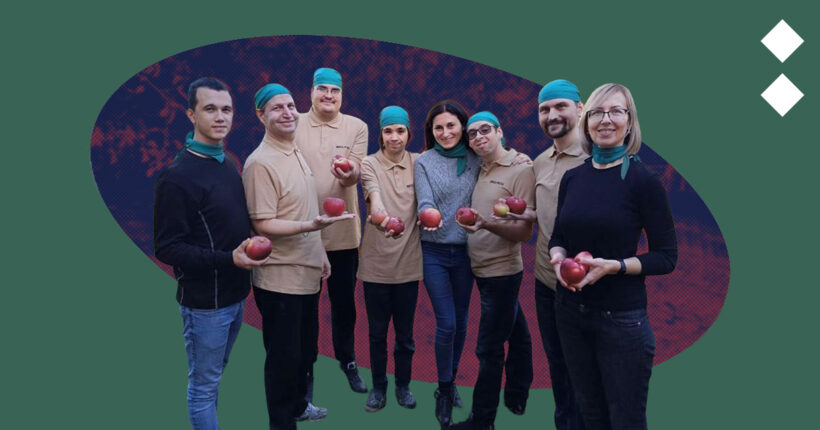
What is the problem?
Ihor is 19 years old, and he has autism spectrum disorder (ASD). According to his mother, Olesya Samoilenko, back in 2004, when Ihor was just born, no one suspected that he had a developmental disorder. He was diagnosed with autism when he was almost six years old, but even after the official diagnosis, nothing changed in his life – since there was no assistance system for such children in Ukraine at that time.
Ihor was rejected everywhere, and specialists did not understand how to work with such a child. If it was possible to agree on a visit to day care, Ihor had to come there with constant parental accompaniment. When it was time to go to school, the doors were closed to him, even in special educational institutions. All his training was reduced to short and ineffective lessons at home — the teacher came three times a week and conducted only one hour-long class. Samoilenko understood more and more clearly that she could not continue like this. However, she, like all other parents who have a child with ASD, was most concerned about another question: she was enveloped by an unshakeable fear of what would happen to her child if she were gone.
What is the solution?
House of supported living
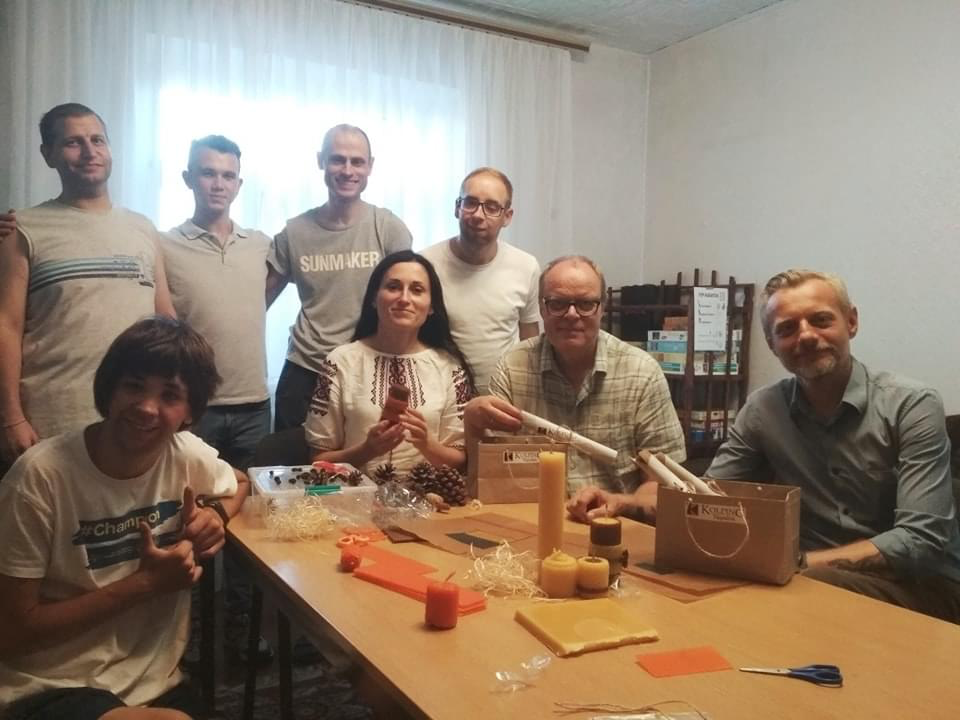
Olesya Samoilenko, together with residents of the House of Supported Living.
Rubryka has already written about supporting the rights of children with ASD to quality education and inclusion. But what to do when children with ASD become adults? The solution was found thanks to the support of a non-governmental organization called Kolping's Case in Ukraine; a House of Supported Living was created in Vinnytsia. Here, eight people over the age of 18 with intellectual disabilities and autism began to learn the skills they need for independent living. A comfortable life in a 24-hour care center is a welcome alternative to shelters.
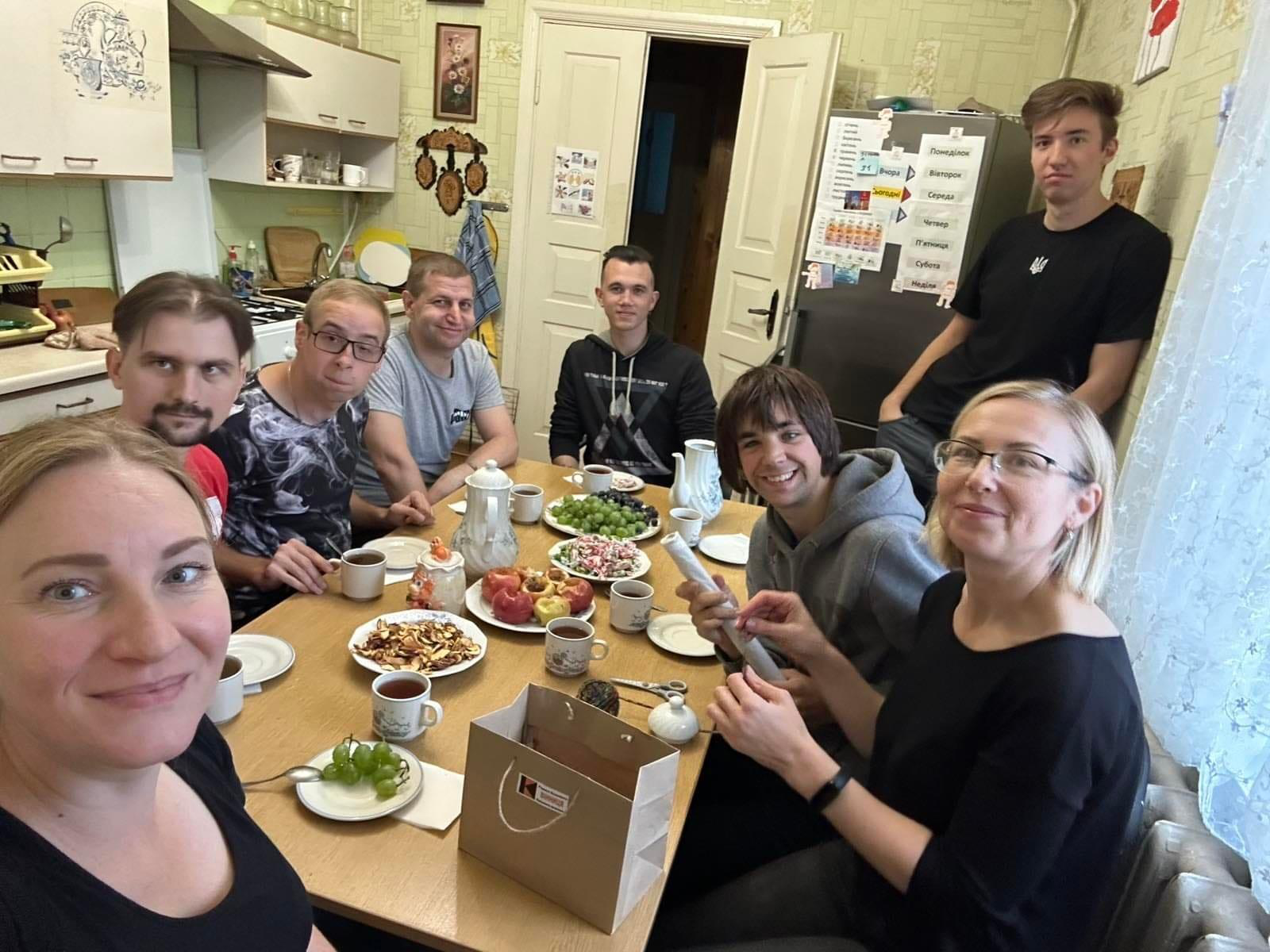
An assisted living facility is one big family.
"It was enough for me to participate once in the monitoring of a residential institution to feel all the horror of a possible prospect for my child. These are places of no freedom, and shelters are especially dangerous for people with autism. An alternative must be created for them," says Samoilenko.
The activist adds that the House of Supported Living answers parents' questions about what will happen to their children when they grow up and leave home.
Life in the house almost resembles a home. Here, the men have a variety of activities related to the formation of independence skills. This is the ability to prepare food, clean up, create a shopping list, and make a daily routine, as well as financial literacy, personal hygiene, the ability to spend leisure time together, awareness of how to act in various everyday situations and issues that may arise in life. All this is combined with working with a psychologist, a social pedagogue, and specialists in social orientation, social-emotional development, and adaptive physical development. This support may continue as long as the person needs it; which, for some, may be life-long.
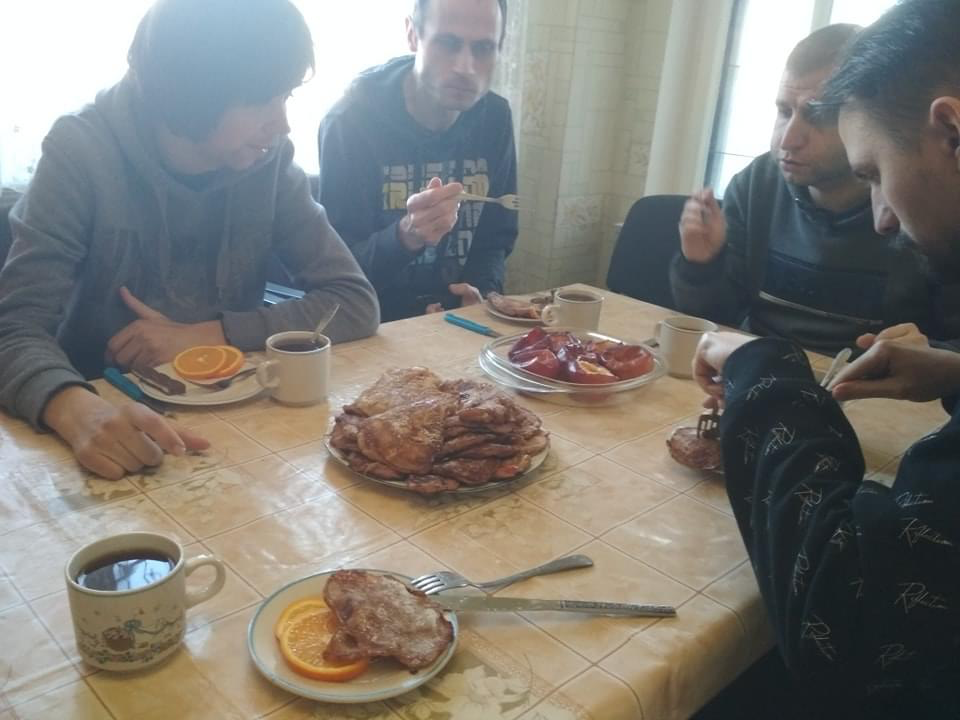
Tea party in the House of Supported Living.
Kolping Family Vinnytsia often shares photos from the lives of the boys on social media. Not everyone knows that even the usual tea party, which is so loved by the youth in the House of Supported Living, is also a training, which is called "Classes in social and household orientation." A much larger and important part remains off-camera: repetition of hygiene rules, safety techniques while working in the kitchen, and following a recipe step by step. Working in the kitchen is combined with exercises to explore the senses of smell, taste and touch.
Setting the table becomes an exercise in aesthetic development, memory training, spatial imagination, symmetry, and balance. The tasting itself is not only the rules of table manners and self-service, but also neurological exercises for the development of both hands and, accordingly, both hemispheres of the brain.
War problems and their solution
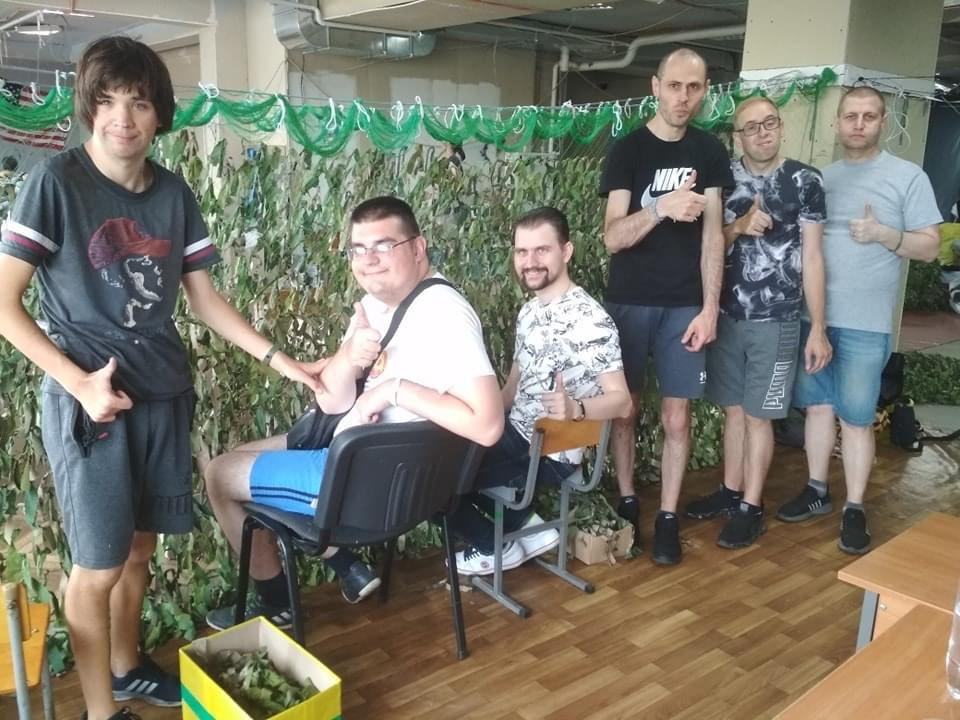
Boys with autism support the Ukrainian military by weaving camouflage nets.
With the beginning of the war, the lack of stable financial support from local authorities and the state to pay specialists became a big problem for the House of Supported Living.
"Since the financial support for the payment of labor was lost, for a certain period, our House performed an important function of a temporary shelter for families of children with disabilities who fled from active hostilities," Samoilenko recalls. "Between February and October 2022, more than 50 people found temporary shelter in the House, but our main goal was to restore the supported living service."
For this purpose, they organized a fair in Landstuhl, Germany, where they sold homemade baked goods, raising €738. Additional support from the Autism Center in the city of Homburg in the amount of €1,500 became helped to resume the work of the House further.
Those with autism and intellectual disabilities who live permanently in the House also did not sit idly by — they wove camouflage nets and cut, twisted, and poured paraffin to make trench candles for Ukrainian soldiers. In winter 2022, the house team made 1,500 candles using over 200 kilograms of paraffin.
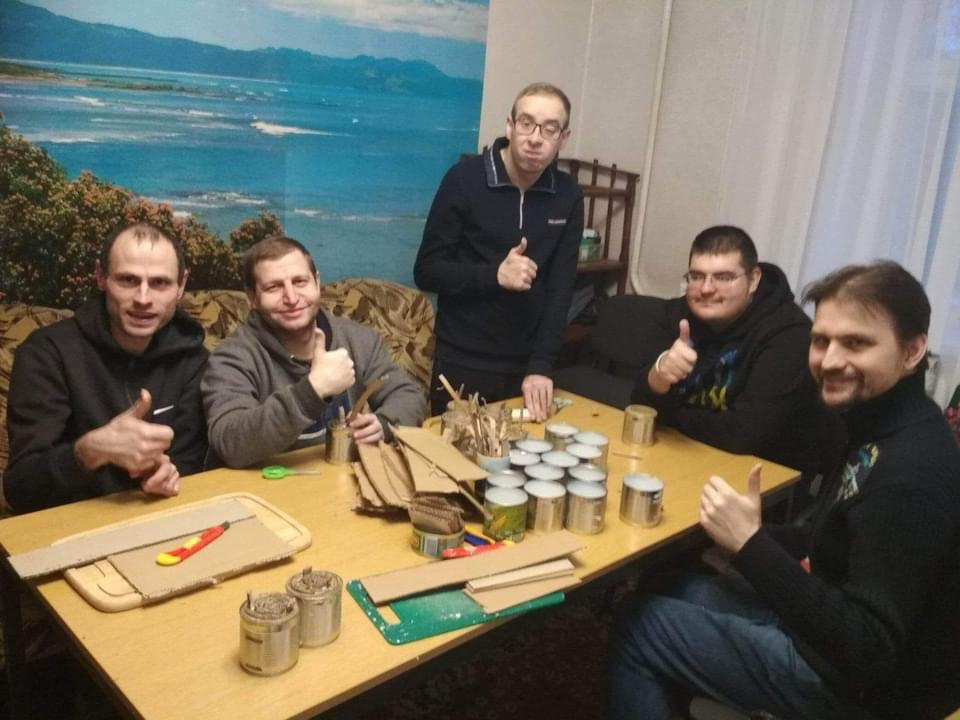
Trench candles in the House of Supported Living are made with hope and love.
"This work brings people together because the guys have to be in contact with other people — communication, new acquaintances, being busy with a common thing is necessary and important," comments Dmytro Havrylyuk, a psychologist at the House of Supported Living.
The SmachnenKO social project was originally a dream
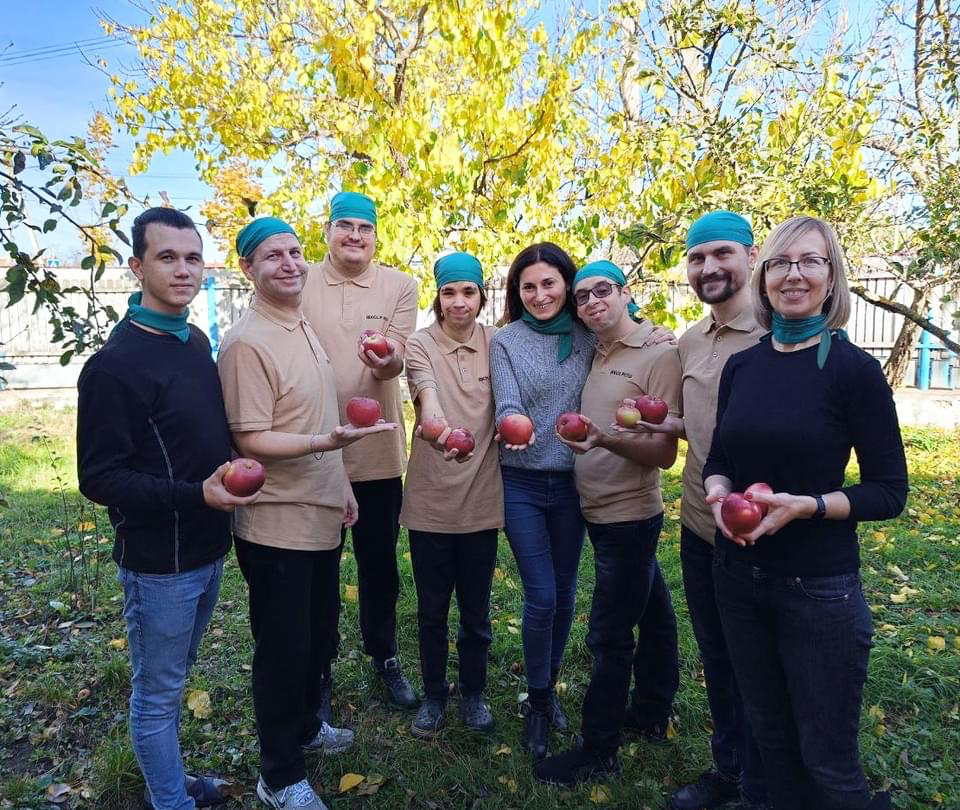
For the guys, this business is a boundless joy and a vital necessity to do what they are good at.
The House of Supported Living doesn't receive state funding to pay specialists, and additional costs related to the service, such as, for example, the purchase of materials for classes. To continue functioning in the future, the NGO Kolpinga Family Vinnytsia launched a new project called SmachnenKO.
Its purpose is to create favorable conditions for the employment of 10 people with intellectual disabilities in the city of Vinnytsia in the production of dried fruits and professional orientation of youth with intellectual disabilities. The project offers ecologically clean and tasty products made by a social enterprise.
"While working with the assisted living service, we have always clearly understood that our boys need employment and work that will bring income. Unfortunately, the majority of people with disabilities, due to impairments in mental development, cannot be employed in the open labor market — about 98% need protected workplaces. Currently, the issue of such social entrepreneurship is also vitally important for us to continue our house's further work," says Samoilenko.
To implement its idea, the organization took part in the "Express online incubator for the creation and development of social enterprises" launched by SILabUkraine. In the open competition held after the end of the training, the SmachnenKO team won and received financial support in the amount of ₴253,960 (around $6,600).
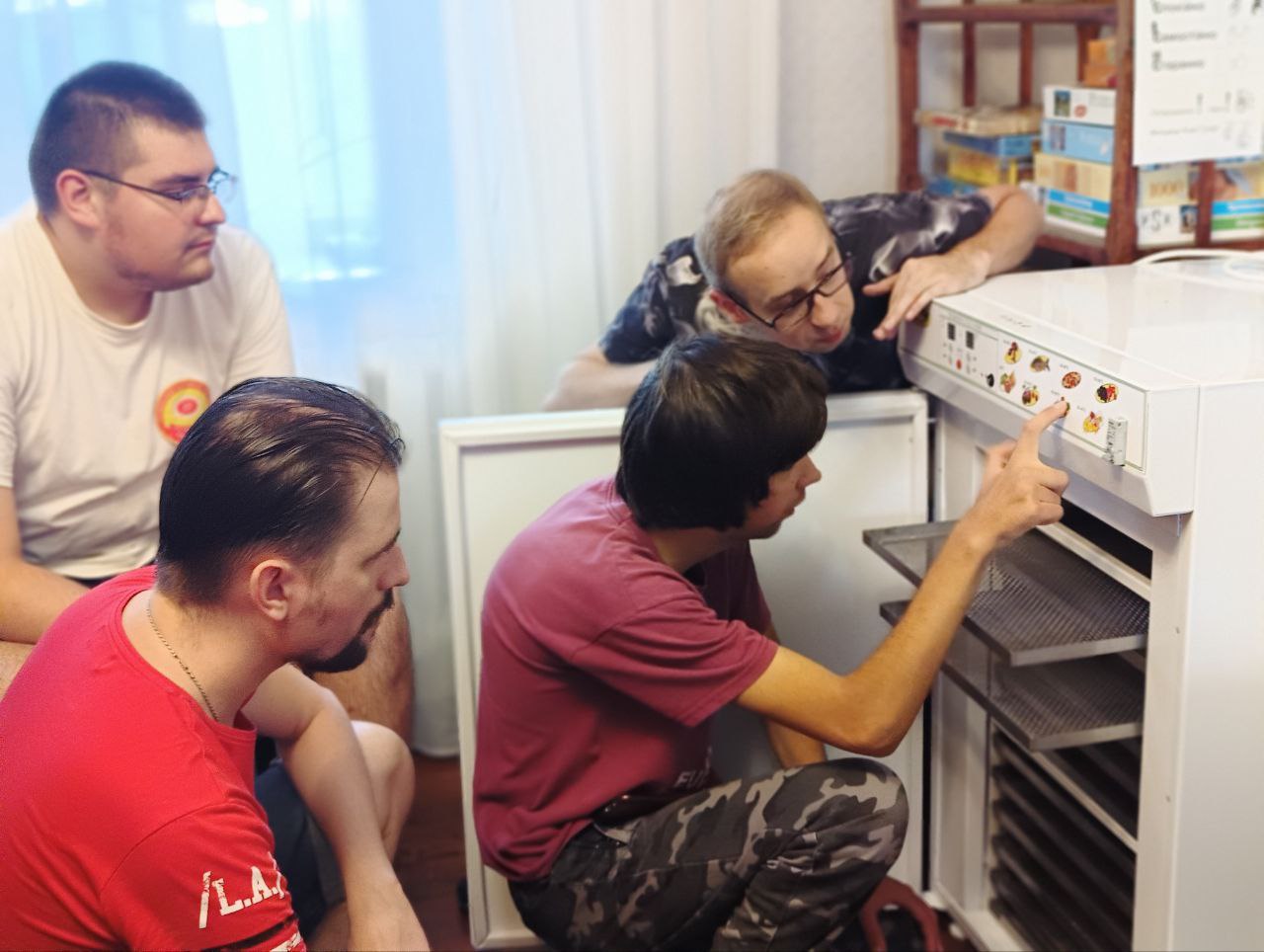
The participants of the SmachnenKO project are mastering a new technique.
During the first phase of the project, the participants received briefings on safety techniques and hygiene rules when working with food products from the preparation of raw materials to the packaging of finished products. The next stage was an internship when all participants practiced all stages of production under the guidance and help of teachers. As a result, everyone knows all the processes.
Specialization arose based on each participant's strengths and weaknesses in work, to divide the team into parts according to technological processes: someone sorts or washes fruit, someone removes cores or stones, someone cuts with a knife or slicer — mechanical or electric; someone lays out slices on grids, someone prepares fruit puree in a blender, pours it, or sprinkles nuts. This helps avoid tension or fatigue, and rationally allocates energy and time. Sometimes, teams change processes because it's interesting to try something different. The pace and nature of this kind of work — calm, moderate, with a clear order and routine — is suitable for people with mental disabilities.
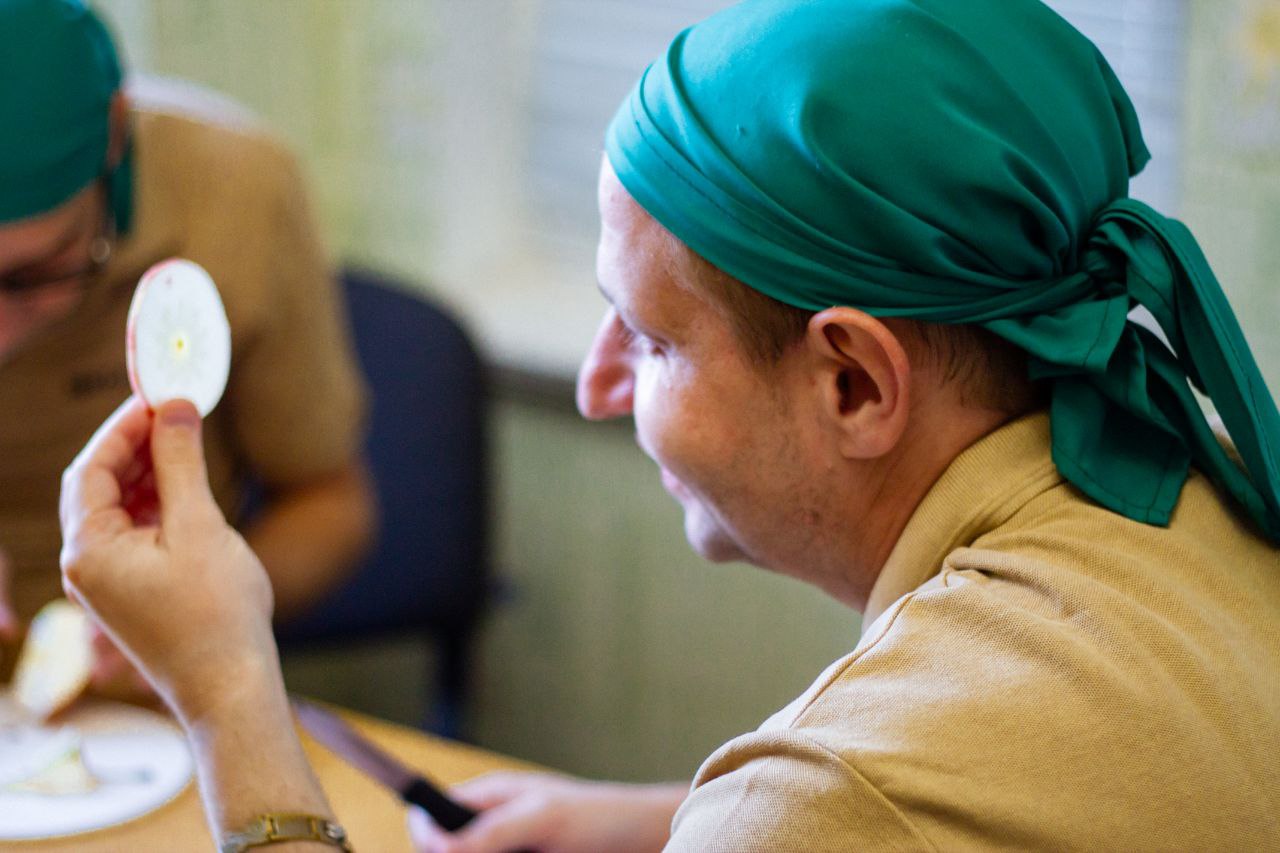
Project participants are proud of their work.
On the production side of the project, everyone can apply and improve their skills in working with kitchen utensils and special equipment – essential skills for living an independent life. Equally important are teamwork, mutual support, and developing friendly communication skills.
Psychologist Dmytro Havrylyuk adds: "For the guys, this business is an infinite joy from communicating with each other and from the process itself when they see the result of their work. They take out ready-made fruits from the dryer, twist them, and pack the products into beautiful bags with labels or stickers with the SmachnenKO logo. Their favorite traditional end of each working day is a joint tea party with the obligatory tasting of fruit roll-ups and dried fruit chips — they really like the goodies made with their own hands." Slicing apples for fruit chips.
Slicing apples for fruit chips.
Employment allows participants to feel like essential members of society who also work and bring benefits while also receiving moral and material rewards.

SmachnenKO produces fruit roll-ups for every taste.
"We started implementation in July. It was very difficult to find the equipment because it had to be as safe and easy to use as possible, and the amount of money was quite small for starting in such a direction," Samoilenko recalls. "The project itself lasts until the middle of December, then we have to work on our own, and we can say with certainty that we will succeed in everything!"
You can support young people and SmachnenKO with any donation by transferring it to the account as a charitable contribution and ordering produce. The funds will go to the operation of the House of Supported Living and the development of the boys and their business, as well as partly to purchase paraffin to manufacture trench candles for the Armed Forces of Ukraine, which the House team has been doing for the second winter.
You can learn more about the project on its Facebook and Instagram pages.
Even more useful solutions!
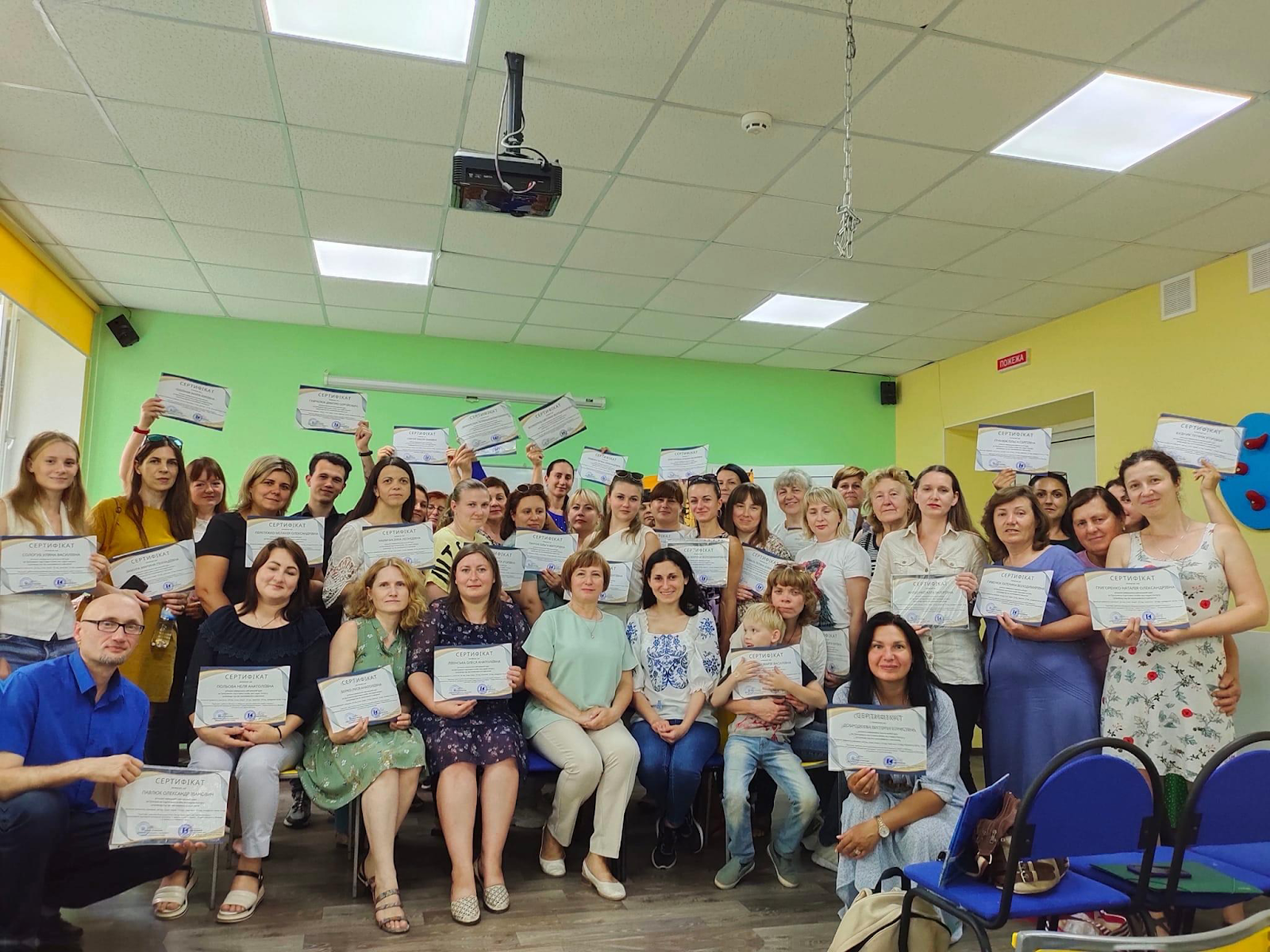
Having joined forces with the Vinnytsia Regional Center of Social Services, a team of professional trainers from the NGO Kolping Family Vinnytsia conducts training of assistants for children with developmental disabilities.
There are still very few such houses for assisted living in Ukraine. According to Samoilenko, one of the huge problems of the organization of supported living is a highly complex process with the social services themselves, difficulties with calculating labor in man-hours, low wages within the limits of social services, very high requirements for the arrangement of the houses of supported living and the availability of many gaps in the regulatory and legal sphere.
There is also a difference in the organization of services for people with different types of disabilities.
"For example, to organize such a service for people with autism, you need specific knowledge and methodology. Such knowledge is necessary to make the service highly quality and generally possible for such people. Without this, a full future is impossible for them, and they will suffer," says Samoilenko.
What should be done?
According to Samoilenko, today, it is absolutely necessary to make changes to the State Standard of Social Services of Supported Living for the Elderly and People with Disabilities, as well as additional educational work in communities to overcome stereotypes about people with intellectual disabilities.
At the same time, the state and community should pay more attention to inclusion. You can find more of Rubryka's articles on the topic here.






